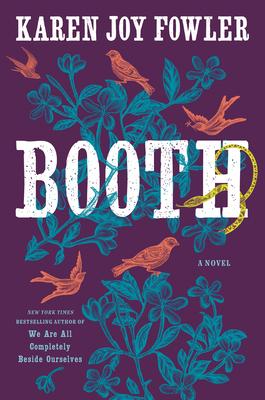I expected to love this book, because I loved Fowler’s previous novel, We Are All Completely Beside Ourselves, and this is historical fiction about a critical time in America. There’s no question the Booths are a fascinating family, and I enjoyed learning so much about them. But I found this book a slow and fairly tedious read.

Fowler gives us a lot of personal knowledge about the Booth family, showing how John Wilkes Booth was shaped and also how his actions impacted the rest of his family. Fowler also shows how the politics of the time gave rise to the extremism that led to Lincoln’s assassination — very much like today. Family members were divided and misinformation was rampant. Booth’s anger and racism made it hard for his family to stay close to him, and only one of them may have truly recognized what he was capable of doing.
It’s written in a very quiet tone and slow pace, which normally I appreciate. But there’s a monotony to the tone of this book, as important events are written in the same way as daily household tasks. We learn every detail about the Booth parents and children, from their frequent moves between Baltimore and rural Maryland, to the friends they make and the way they eat and dress. I love a period novel with a lot of specificity, so I’m finding it hard to describe why I was frustrated with this one. I found it hard to get really engaged in the story. The frequent shifts in perspective also made it difficult to connect to the characters.
I felt like this story of John Wilkes Booth’s childhood was so slow, and yet towards the end when Lincoln is assassinated, the story feels rushed. Fowler says she wanted to tell a story of how families of notorious shooters are impacted, yet we see only a glimpse of the aftermath of the crime (while we hear about every acting job he ever took). I believe Fowler wanted to tell this story about aspects of his life that aren’t already known, but it often felt like too many unimportant details were shared.
What she did accomplish, however, is bringing to life the family that surrounded and molded John Wilkes Booth – the brother he competed with all his life, the sister he adored, and the older sister that was more like a mother to him. She humanizes Booth by showing his failures and his insecurities. He was more than an assassin, and the Booths were more than an assassin’s family.
Fowler incorporates a lot of research, such as actual letters, in the lives of these characters, except for Booth’s oldest sister Rosalie, of whom very little is known, because in a family known for drama, she stayed home and took care of them all. I very much enjoyed her character and my favorite parts were the ones from her perspective. However, Fowler’s exploration of the characters came to feel repetitive – their defining characteristics didn’t change and develop over time (Edwin was the sensitive one, Asia the pampered, dramatic younger sister, and John was the hot-headed, passionate one).
If you’re interested in a history of the stage in the United States in the 1800’s, this book will certainly interest you. Fowler writes about how acting styles changed over time. For example, Junius Booth performed with great dramatic flair, while his son Edwin was seen as unemotional – but over time his performances came to be seen as nuanced. It was interesting to learn how integral performing was to this family, and how celebrated they were – since now we only know about the Booths for one reason.
What I appreciated most about this book was learning new things about the Civil War and slavery in the U.S. that I hadn’t heard before, like the attack on New York City by Confederate rioters and the Christiana incident, where a group of free and enslaved blacks resisted an attempt by a slaveholder to recover four escaped slaves.
This is the kind of book where I put it down and immediately started reading about the Booth family online. I appreciated that this book looked at an important historical period from a new perspective. I just wish I enjoyed the book more.
Note: I received an advance review copy from NetGalley and publisher Putnam Books. The book published March 8, 2022.

